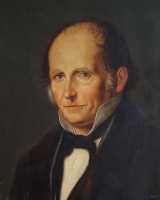| Adolph Diesterweg | |
| 弗里德里希·阿道夫·威廉·第斯多惠 | |
| | |
生平
1790年10月29日,出生于锡根。1808年至1811年就读于赫伯恩大学和蒂宾根大学,在1811年开始了教师生涯。他在曼海姆和沃尔姆斯担任了两年家庭教师,然后任教于法兰克福模范学校。后来,他成为埃尔伯费尔德拉丁学校校长。1820年,他被任命为新成立的默尔斯师范学校校长,在那里实践裴斯泰洛齐提出的方法。1832年,他改任柏林师范学校校长,在这里,他证明了自己是无宗派的宗教教育的坚定支持者。1846年,他在潘科成立了裴斯泰洛齐协会,资助教师留下的寡妇和孤儿。1847年从师范学校辞职。1850年,他收到了政府发放的退休金。此后,他继续大力提倡他的教育思想,但仅仅通过期刊的媒介。1858年,他当选为柏林市的众议院议员,支持自由派。1866年7月7日在柏林去世。
哲学
第斯多惠认为批判性和责任对于教学非常重要,并试图改革社会,经济和道德教育,出版了有影响的Pädagogisch Wollen und Sollen。对于天主教/新教冲突,他认为有几个不同的选择,而非简单的“权力或自由,天主教或新教”。
第斯多惠努力改革教育,试图消除政治和宗教对教学本身的影响,而是涉及更多的社会因素。他相信教育的价值:“首先是教育人,然后才是关心职业训练,因为无产阶级和农民都应该进行教育,使其成为人”,他还认为,通过教育可帮助扶贫。他希望实现教师的专业化,寻求学校的相对自主;他还通过他的报纸Rheinisch Blätter影响当时的教师。
作品
第斯多惠是一个教育方面的多产作家,而且是许多学校教材的作者。 他撰写了50本书籍,发表论文约400篇;还说了“通过做学会做”的名言。
参考文献
- ^ 1.0 1.1
 Diesterweg, Friedrich Adolf Wilhelm. Encyclopedia Americana. 1920.
Diesterweg, Friedrich Adolf Wilhelm. Encyclopedia Americana. 1920. - ^ 2.0 2.1 2.2
 Chisholm, Hugh (编). Diesterweg, Friedrich Adolf Wilhelm. 大英百科全書 (11th ed.). 剑桥大学出版社. 1911.
Chisholm, Hugh (编). Diesterweg, Friedrich Adolf Wilhelm. 大英百科全書 (11th ed.). 剑桥大学出版社. 1911. - ^ Gross, Michael B., The War Against Catholicism illustrated, University of Michigan Press: 32, 2004 [2009-03-13], ISBN 0472113836, 9780472113835 请检查
|isbn=值 (帮助) - ^ Smith, M. K. (2009) 'Social pedagogy' in the encyclopaedia of informal education.
- ^ Kliebard, Herbert M., The struggle for the American curriculum, 1893-1958 illustrated, New York, [USA]: RoutledgeFalmer: 32, 2004 [2009-03-13], ISBN 978-0-415-94891-3
Biography
Educated at Herborn and Tübingen universities 1808-1811, Diesterweg began teaching in 1811. He taught at Mannheim and at Worms for about two years, and then moved to the model school in Frankfurt am Main. Later he became rector of the Latin school of Elberfeld. In 1820, he was appointed director of the new teacher's seminary at Mörs where he put in practice the methods of Pestalozzi. In 1832, he was summoned to Berlin to direct the new state-schools seminary in that city. Here he proved himself a strong supporter of nonsectarian religious teaching. In 1846, he established the Pestalozzi institution at Pankow, and the Pestalozzi societies for the support of teachers’ widows and orphans. Because of his disagreement with the authorities regarding important phases of higher education he was in constant friction and resigned from the seminary in 1847. In 1850, he received a government pension. Thereafter, he continued to vigorously advocate his educational ideas through the medium of periodicals. In 1858, he was elected to the chamber of deputies as member for the city of Berlin, and voted with the Liberal opposition.
Philosophy
Diesterweg thought criticalness and responsibility were important in teaching, and sought to reform social, economic and moral aspects of education publishing the influential Pädagogisch Wollen und Sollen. He based his program on what was named the "basic principles of the struggle for life" that he saw in the Catholicism/Protestantism conflict. He thought there were several 'oppositions' (distinct choices) that were available in the conflict which could be reduced to a single "authority or freedom, Catholicism or Protestantism".
In his effort to reform schooling Diesterweg wanted to remove political and religious influence in the teaching itself and instead involve more of a social factor. He believed in the availability of education: "First educate men, before worrying about their professional training or class, [because] the proletarian and the peasant should both be educated to become human beings"; he also believed that through education the poor could be helped. He wanted professionalization of state teachers and fought for the relative autonomy of schools; he also had an influence on the teachers of that time through his newspaper Rheinisch Blätter.
Works
Diesterweg was a voluminous writer on educational subjects, and was the author of various school text-books. He authored 50 books and published about 400 papers; he has been credited with originated the phrase 'learn to do by doing' by one source. In 1851, he founded the Pädagogisches Jahrbuch (Yearbook of pedagogy) in Berlin. Among his publications were:
- Wegweiser zur Bildung für deutsche Lehrer (Guide for the instruction of German teachers; 2 vols., 1834; 6th ed., 1 vol., 1890)
- Das pädagogische Deutschland (German pedagogy; 1836)
- Streitfragen auf dem Gebiete der Pädagogik (Controversial questions in the field of pedagogy; 1837)
- Leitfaden für den Unterricht in der Formlehre (1845)
- Lehrbuch der mathematischen Geographie (1840; 18th ed., as Populäre Himmelskunde, 1891)
- Unterricht in der Kleinkinderschule (5th ed., 1852)


